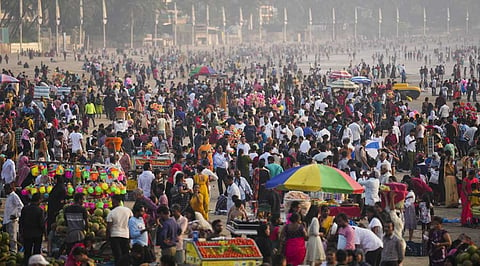

KOLKATA: Following the implementation of the Citizenship Amendment Act (CAA), the Matua community now envisions a future which is free from the spectre of being labelled as foreigners, with prospects in public sector employment and access to government schools.
Matuas, originally from East Pakistan, are a weaker section of Hindus who migrated to India during the Partition and after the creation of Bangladesh following religious persecution.
Rules of the CAA were notified on Monday and the government will now start granting Indian nationality to persecuted non-Muslim migrants -- Hindus, Sikhs, Jains, Buddhists, Parsis and Christians -- from Pakistan, Bangladesh, and Afghanistan who arrived in India before December 31, 2014.
"The difference between this new citizenship act and the earlier one is that we can now get legal citizenship of this country," said Mahitosh Baidya, the general secretary of Matua Mahasangha, an organisation of the community.
"We have faced immense problems due to lack of proper documentation proving that we are citizens of this country. There have been instances when our children failed to study in government institutions. Even people had to give up government jobs as they did not have proper documents to prove their citizenship," he said.
Responding to assertions that Matuas possess voter cards, Aadhaar cards and ration cards, Baidya explained that these documents do not suffice as proof of citizenship.
"Most of them don't have valid documentation, and these documents won't mean anything if there is any scrutiny about their citizenship as they don't have proper citizenship certificates," he stated.
Several Matua leaders, who did not wish to be named, claimed that voter and Aadhar cards are very easily available illegally.
Reflecting on the challenges faced by Matuas, BJP MLA and Matua leader Asim Sarkar underscored that possessing voter and Aadhaar cards does not guarantee citizenship.
He highlighted cases where Matuas or other Hindu refugees were booked under the Foreigners Act due to the discovery of fake documents.
"A voter card is never proof of citizenship. It is a sort of a legal pass to cast your vote," he said.
Describing the CAA as their "second independence day," Matua leaders expressed optimism regarding its potential to address longstanding concerns.
The community, with an estimated population of three million in the state, can tilt the scales in favour of a political party in more than 30 assembly seats in Nadia, and North and South 24 Parganas districts bordering Bangladesh.
Since the '90s, political parties have courted the support of the Matuas, whose substantial population and tendency to vote cohesively render them a valuable voting bloc akin to minority groups, particularly in alignment with the BJP's stance on the CAA.
Activist Mohit Ray hailed the CAA as a beacon of hope for Hindu refugees, who have lived under the constant threat of being deemed foreigners due to their lack of proper documentation.
"CAA will bring a new dawn in the lives of the Hindu refugees," he said.
Ray, who is presently the spokesperson of the Bengal BJP, said the CAA will open doors for the refugees to be part of the Indian system and enjoy every welfare scheme as legal citizens of the country.
"A few days ago, there was a controversy over the cancellation of the Aadhaar cards in Bengal. If you check, you will find that most of them had come to the country after December 31, 2014. So if this CAA was not implemented, the same would have happened with the refugees who had come to this country before 2014," he said.